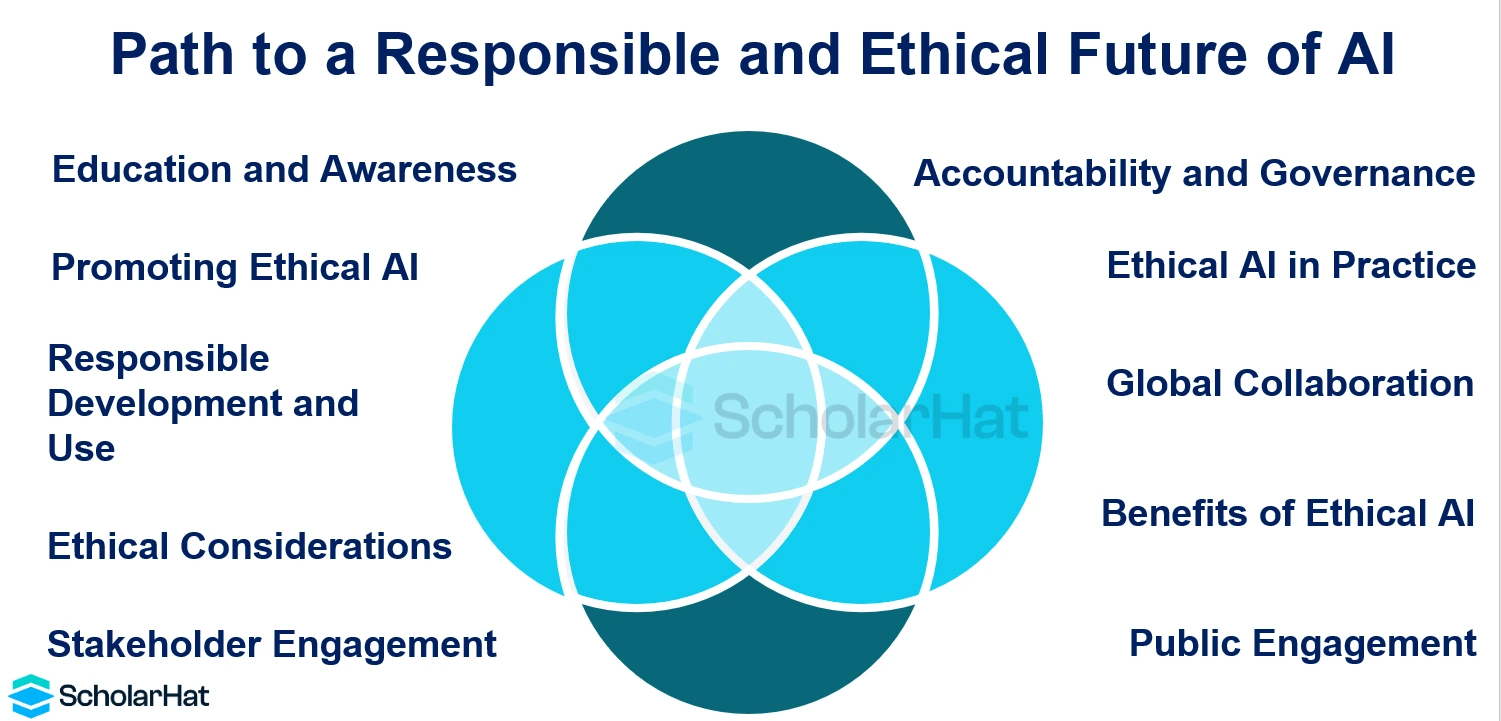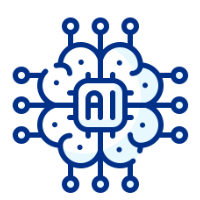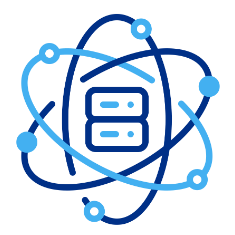18
AprEthics & Future of AI
Introduction
Artificial intelligence (AI) has radically changed industries and the way we live and work, becoming an essential component of daily life. But as AI develops, it is crucial to be aware of the ethical issues that surround its creation and application. In this Artificial Intelligence tutorial, we will delve into the concept of ethical AI, which involves the responsible conception, creation, and implementation of AI systems that uphold fundamental rights and human values. The goal of this article is to explore the many dimensions of ethical AI and highlight how crucial it is to pave the way for an ethical and responsible Future of AI.
The Importance of Ethical AI
- Respect for human rights, dignity, & privacy is ensured by ethical AI.
- By eliminating prejudices and unfair practices, ethical AI advances justice and equality.
- Through ethical AI, transparency and confidence are promoted, enabling consumers to understand and believe AI judgments.
- Identification & mitigation of potential dangers and negative effects linked with AI are made possible by ethical AI.
- Innovation & long-term sustainability are promoted by ethical AI.
- Developers can produce AI systems that are advantageous to society as a whole by taking ethical considerations into account from the beginning.
- Beyond immediate financial gain, ethical AI emphasizes broader societal effects.
Ethical Considerations in Artificial Intelligence
- The creation and use of AI systems must take ethical issues seriously.
- A crucial ethical issue is addressing potential prejudice in AI algorithms.
- To avoid biases that perpetuate unfairness and discrimination, developers must assess and manage training data.
- A major ethical question is how AI will affect jobs and human welfare.
- The equal distribution of benefits and assistance for those impacted by automation are requirements for ethical AI.
- AI systems must prioritize protecting human welfare and avoiding harm by taking into account the effects of their decisions.
- In order to upskill and retrain those impacted by automation driven by AI, proactive actions are required.
Examples of Ethical Issues in AI
AI algorithms that are biased: AI systems can reinforce biases found in training data, which might result in unfair results or discriminatory practices. An essential ethical concern is addressing and reducing bias.
- Privacy concerns: By enabling widespread monitoring or unauthorized data collection, AI technology like facial recognition may violate people's right to privacy. Privacy protection and responsible data use are key components of ethical AI.
- Lack of transparency: It raises ethical questions when AI systems behave like "black boxes" and make judgments without giving reasons. In order to promote accountability and trust, and to spot and correct any potential biases or errors, openness and explanation are essential.
- Impact on jobs and the economy: The extensive use of automation and AI may result in job loss and economic inequality. Ensuring a reasonable transition, helping impacted employees, and dealing with potential societal implications are all ethical considerations.
- Weapons driven by artificial intelligence (AI): The development of autonomous weapons brings up moral concerns regarding accountability, proportionality, & the potential for unchecked war escalation. International humanitarian rules must be followed and strict regulation is needed to ensure the ethical use of AI in conflict.
- Deepfakes and false information: Artificial intelligence-generated deepfakes can fudge or invent media content, spreading false information and weakening public confidence. To protect the integrity of data, ethical AI requires the appropriate usage, identification, and mitigation of deepfakes.
- Social impact & algorithmic fairness: AI systems may unintentionally worsen social injustices or even perpetuate them. Fairness, inclusion, & the avoidance of discriminatory consequences are ethical requirements for algorithmic decision-making systems.
Future of AI
- Healthcare, banking, transportation, and entertainment are just a few of the fields where AI has the potential to change the course of human history.
- These industries are changing as a result of AI, opening up new possibilities.
- The future of AI must take ethical issues into account.
- We can ensure that AI is used ethically and for the good of society by adding ethical principles.
- AI's promise for societal benefit can be realized through ethical AI design and application.
- AI's ethical implications should be taken into account to help avoid potential harm and lessen bad effects.
- AI technology must be used responsibly if we are to build a sustainable and advantageous future.
Navigating the Path to a Responsible and Ethical Future of AI

Finding the Way to an Ethical and Responsible Future of AI:
Education and Awareness
- It is important to spread knowledge and awareness concerning ethics for AI.
- Resources that are plentiful and simple to obtain for learning about ethics for AI.
- Research papers, books, and online courses all offer insightful information.
- Staying informed about new ethical issues and ongoing learning.
Promoting Ethical AI
- Several initiatives and organizations work hard to advance ethical AI.
- There are research organizations, advocacy organizations, and industrial consortiums involved.
- Establishing standards, protocols, and best practices for moral AI.
- Industry and governmental organizations should support and work together on these efforts.
Responsible Development and Use
- Individuals' contributions to the ethical creation and application of AI are referred to as "responsible development and use."
- maintaining knowledge of ethical concerns and participating in ongoing learning.
- Government and business organizations make sure that ethical norms are upheld in AI development.
- Use of AI technologies in a responsible manner.
Ethical Considerations
- Understanding and tackling the ethical issues raised by artificial intelligence.
- The significance of taking into account how AI will affect society and people.
- Considering the advantages and dangers of AI implementation.
- Proactive steps to reduce potential risks and prejudices.
Stakeholder Engagement
- Cooperation between stakeholders for moral and responsible AI.
- Involving business, the government, academia, and the community.
- Transparency, inclusion, and open communication in decision-making processes.
- Taking into account various viewpoints and beliefs when developing and deploying AI.
Accountability and Governance
- Establishing governance and accountability frameworks for AI systems.
- Defining precise duties and obligations for regulators, users, and developers.
- ensuring that AI algorithms and decision-making processes are transparent and comprehensible.
- Regulatory structures for enforcement and oversight and ethical review boards.
Ethical AI in Practice
- Integrating moral considerations into the design and development of artificial intelligence.
- Gathering, handling, and use of data with responsibility.
- To find and rectify biases and unintended outcomes through routine audits and reviews.
- Monitoring and analysis of the social impact of AI systems on a regular basis.
Global Collaboration
- International cooperation towards ethical and responsible AI.
- Sharing knowledge, expertise, and experiences.
- Harmonizing international laws and moral principles.
- Addressing potential issues and dangers related to the advancement of AI globally.
Benefits of Ethical AI
Outlining the possible advantages of ethical AI.
- Increasing the decision-making process's impartiality, inclusivity, and transparency.
- Utilizing AI technologies to empower people and communities.
- Assisting in the development of ethical and sustainable AI applications.
Public Engagement
- Involving the general public in AI debates and decisions.
- Transparency and accountability are key to fostering public trust.
- Ensuring public participation in governance and policy-making for AI.
- Enabling and educating people to appropriately comprehend & navigate the AI landscape.
The Need for Ethics for AI in Industry and Government
Ethics for AI are Needed in Government and Industry:
- Shared responsibility: Individuals, businesses, and the government all have responsibilities for upholding AI ethics.
- Industry focus: Give governance frameworks a priority and prioritize ethical AI practices.
- Government role: The job of the government is to enforce laws, work with specialists, and defend societal ideals.
- Collaboration: Encourage government and industry to share expertise.
- Proactive measures: Recognise and handle ethical issues while juggling innovation and responsibility.
- Supporting values: Assure fairness, transparency, and the reduction of bias.
- Regulatory frameworks: Implement rules for the creation and application of AI.
- Public engagement: Engaging the public means getting their feedback and increasing accountability and transparency.
- Constant adaptation: Address new ethical issues and advance ethical AI.
- Accountability: Government and business organizations must take responsibility for AI ethics.
Resources for further learning and practice
Online tutorials and courses: Explore Additional Learning and Practice Resources with us at https://www.scholarhat.com/training/artificial-intelligence-certification-training. There are numerous online tutorials and courses available that specifically focus on Artificial Intelligence.
Summary
It is essential to think about the ethical implications of AI research and use as it continues to evolve and influence many facets of our lives. Ethical AI makes ensuring that technology upholds moral principles, encourages justice, and builds trust. We may create a future that is both technologically advanced and morally sound by comprehending the significance of ethical AI, navigating its intricacies, and actively engaging in ethical practices. Let's seize the chances that AI offers while maintaining the values that will lead to a future where AI is ethical and responsible.







